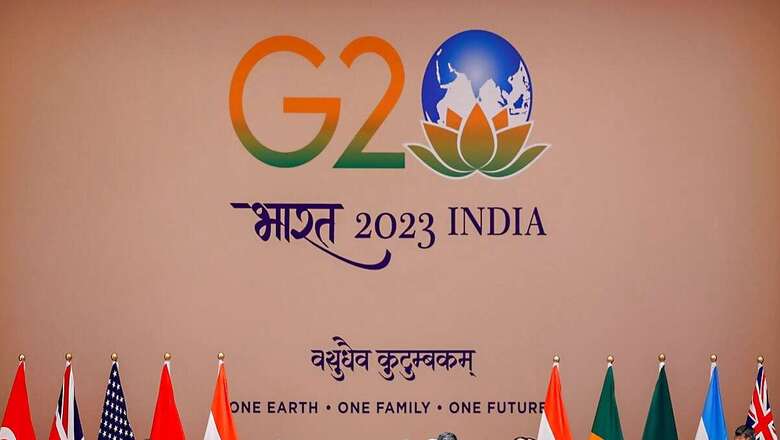
views
Beyond New Delhi: How India Made the G20 a Nationwide Celebration
One year after India hosted a highly successful G20 summit, its presidency is remembered not just for its high-level diplomatic achievements, but for how it transformed a global summit into a truly national event. India defied convention by not reserving the G20 summit for its capital city. Rather, it federalised the hosting of the G20, dispersing events among different states and towns, each exhibiting its distinct economic and cultural environment.
With this strategy, India’s G20 was transformed from a centralised diplomatic event into a celebration of the country’s federalism and diversity.
This shift was driven by the vision of Prime Minister Narendra Modi, who wanted to ensure that the benefits of hosting such a prestigious event were shared across the country. The prime minister, aware of the growing role cities and states play in shaping global perceptions, ensured that the G20 became an opportunity for India’s subnational actors to step onto the world stage.
For cities like Udaipur, Srinagar, and Varanasi, the G20 meetings were not only an opportunity to showcase their cultural heritage but also to attract future investments and tourism. This approach also had significant economic benefits for the cities involved. Local businesses thrived, artisans gained international exposure, and tourism received a major boost. Infrastructure improvements made for the summit continue to benefit these regions long after the G20 is over.
Last year, India set an example for the world on how high-stakes diplomatic events can be turned into national celebrations, with cooperative federalism and “jan bhagidari” (people’s participation) as their foundational principles. By November 2023, India hosted over 220 G20 meetings in 60 cities across all 28 states and 8 Union Territories. More than 1 lakh participants from approximately 125 nationalities participated in these events spread across the country. Over 1.5 crore Indians are estimated to have been involved in these programmes or have been exposed to various aspects of them.
The impact of India’s national G20 presidency was perceptible, as several Tier 2 and Tier 3 cities got major facelifts, whether it be in terms of roads and highways, hospitals, hotels or even the maintenance of tourist sites and monuments. India also got its messaging right in almost all instances. For example, the three-day meeting of the G20 Employment Working Group in Indore, Madhya Pradesh was a ‘zero waste’ event. Delegates were provided with writing pads of reusable paper, even as the use of plastic bottles remained prohibited.
Each state that hosted a meeting brought its local culture, cuisine, and crafts to the forefront. Whether it was showcasing the intricacies of Banarasi silk in Varanasi, or organising a Kathakali performance in Kerala, the G20 guests were treated to a panoramic view of India’s rich cultural tapestry. This cultural diplomacy was intentional. By presenting a wide array of traditions, from classical music to folk dances, India not only highlighted its diversity but also demonstrated how deeply rooted its unity is. It sent a message to the world that India’s strength lies in its plurality.
Besides, the impact on local tourism was noteworthy too. In Srinagar, for example, foreign tourist arrivals increased by nearly 60 per cent after the G20 meeting. Designated cities even witnessed hotel prices spiking after it was announced that they would host G20 meetings, implying a surge in demand owing to greater tourist footfall. In the first four months of 2023 alone, the arrivals of foreign tourists surged 166 per cent compared to the same period in 2022.
The government also adopted a destination-centric approach. In order to showcase the strides India has taken in its digital drive, technologies like artificial intelligence and AR/VR were deployed to help travellers plan their visits and provide virtual tours and simulations of historical sites.
The economic impact of these G20 meetings on the cities where they were hosted cannot be overstated. Hotels and restaurants buzzed with business, local artisans found new markets, and cities saw infrastructure improvements in preparation for their global guests. Hosting a global event across multiple cities also created a ripple effect. Municipal corporations, state governments and local businesses invested in upgrades that will have long-term benefits. Improved roads, beautified public spaces, and better transportation systems are just a few of the dividends these cities are enjoying a year after India’s G20 is over.
In a world where governance is often centralised, India’s decision to federalise its G20 presidency stands out. India’s G20 presidency became a model of how to engage with the world while bringing every part of the country into the conversation. By giving all states the opportunity to host G20 events, the Central government demonstrated that global diplomacy is not the exclusive domain of a country’s national capital.
Prime Minister Modi’s decision to federalise the G20 presidency was not just a logistical choice, it was a visionary step towards reimagining global engagement. It brought the G20 closer to the people of India, and in doing so, it brought India closer to the world.
Views expressed in the above piece are personal and solely that of the author. They do not necessarily reflect News18’s views.


















Comments
0 comment